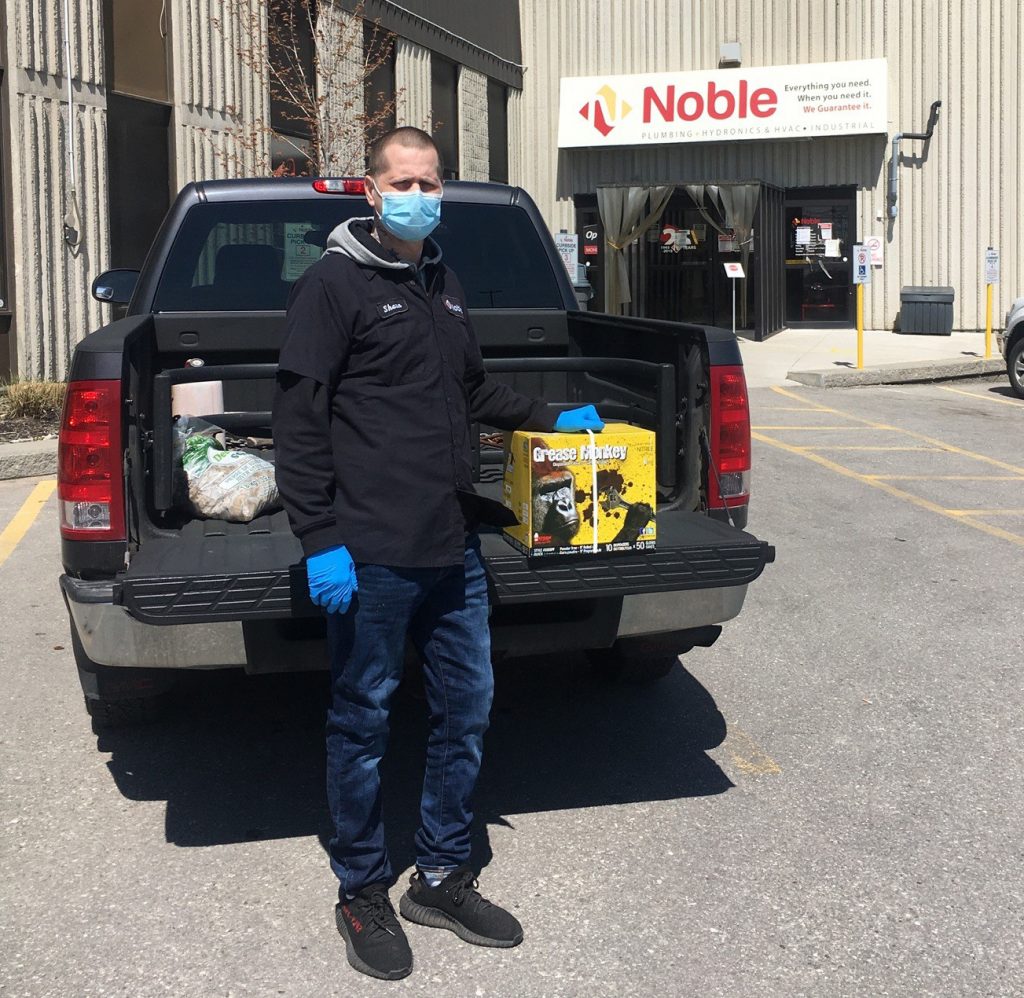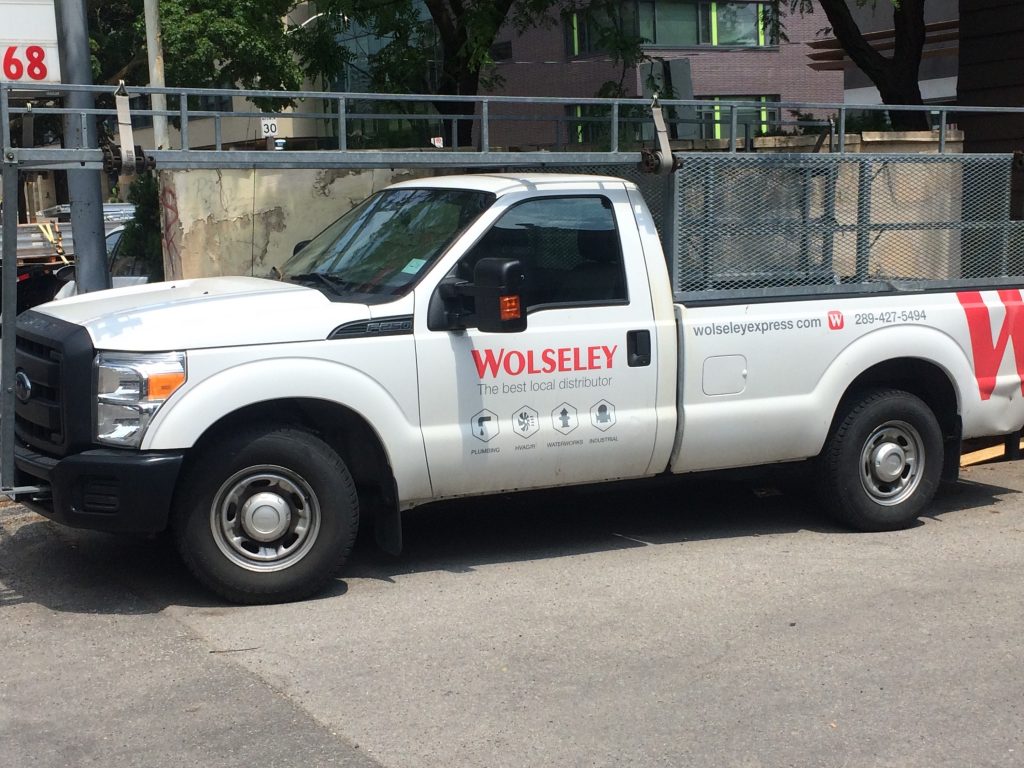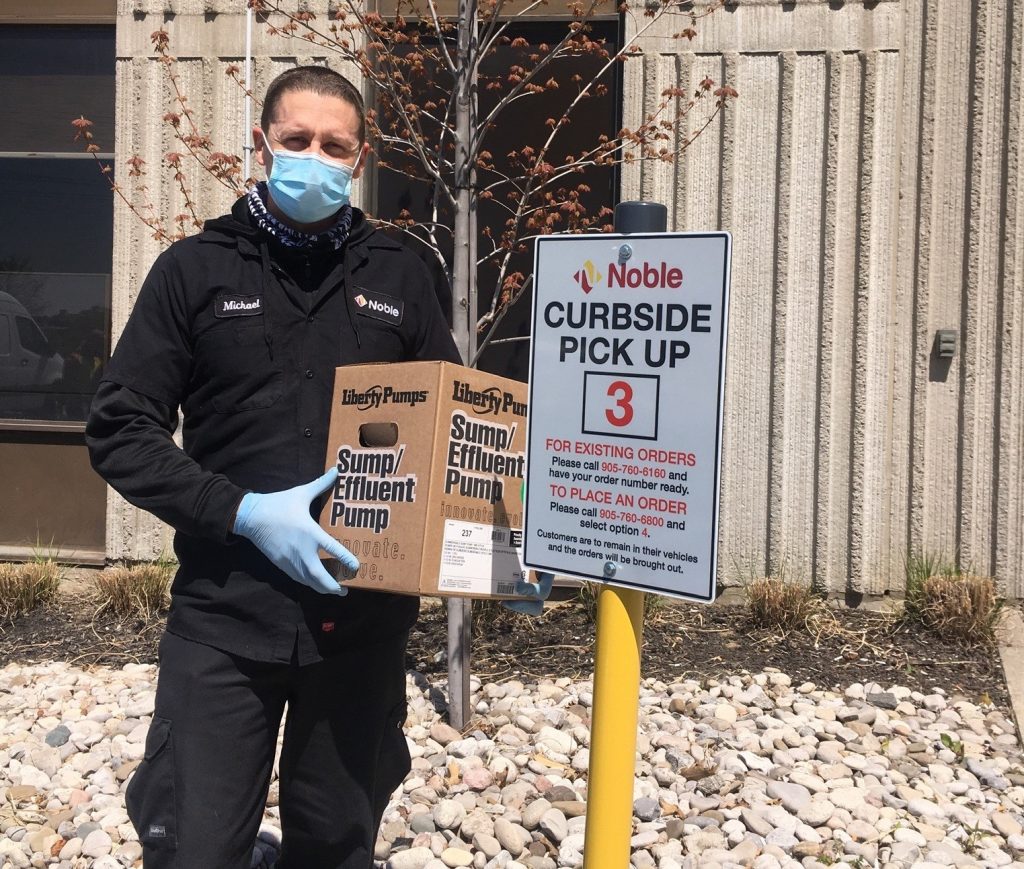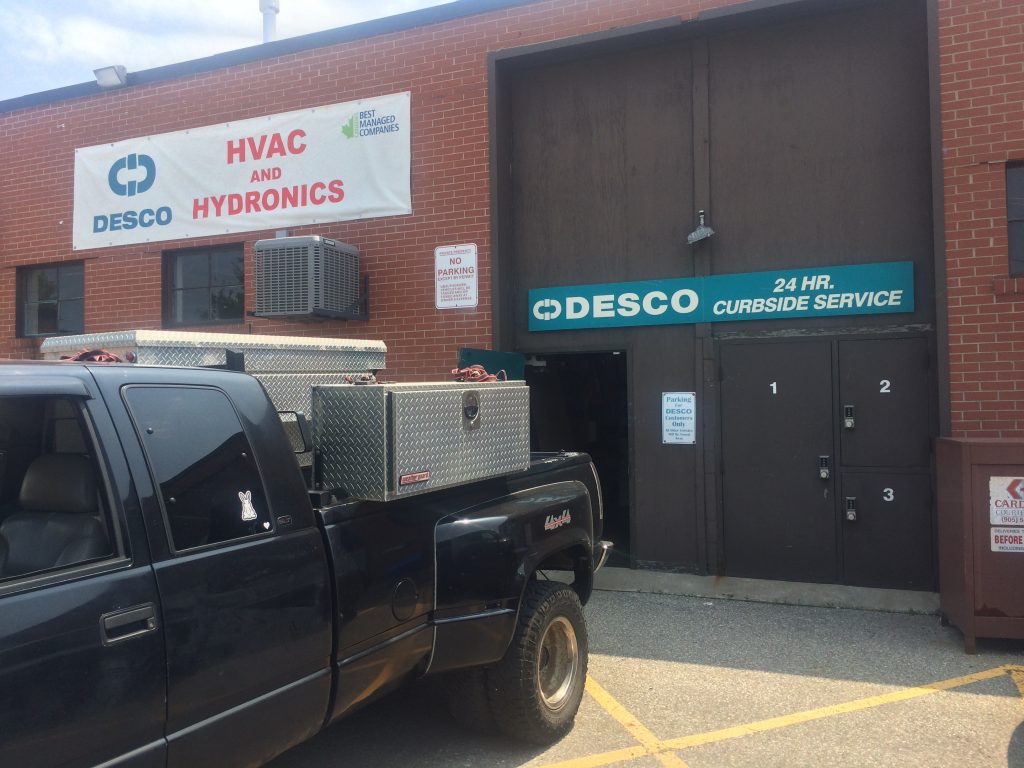
Curbside Appeal
July 28, 2020 | By Doug Picklyk
Wholesalers in Canada are adapting during the pandemic and finding ways to better serve the industry.

Noble team member Shawn Kraft making a curbside delivery.
The supply chain model in the plumbing and HVAC/R industry is constantly under pressure. Manufacturers are looking for better ways to go to market, seeking the best methods to get into the minds and ultimately into the hands of the experts who will be recommending or indeed installing and maintaining their products.
The wholesaler distribution channel has been an effective avenue to reach a greater number of contractors and technicians in different regions of a country as vast as Canada. The variety of wholesaler locations from coast-to-coast serve as convenient warehouses for fixtures, parts and supplies while also acting as a resource and a welcome countertop to share industry chatter with colleagues.
In 2020 that face-to-face connection was interrupted due to the COVID-19 pandemic as distributers across the country had to close their doors while still keeping the supply chain operating for the essential services of the plumbing and HVAC/R industries.
Neil McDougall
“Strangely, even though the pandemic imposed physical distancing, it in return allowed us to get closer to our customers by being more attentive to their needs and adapting our services to their new reality.”
- Neil McDougall, president, Master Group
“The pandemic has really changed the ways of doing business, internationally. It has obviously pushed us to see things from a different perspective and to ensure we adjust to our customers’ needs while following government guidelines for health and safety measures,” notes Neil McDougall, president of the Master Group, the Montreal-based independent national distributor with some 44 branches coast-to-coast. “Strangely, even though the pandemic imposed physical distancing, it in return allowed us to get closer to our customers by being more attentive to their needs and adapting our services to their new reality.”
Communication with customers has been a very important element of managing through this transition. “We never stopped operating but we had to pivot very quickly,” recalls Gail Kaufman, vice president marketing and e-business with Wolseley Canada. The national wholesaler operates over 220 branches across the country. “First and foremost for us was, ‘How do we keep our people and our customers safe?’ So we locked our branches and we went into communication overdrive.”

When COVID-19 restrictions began, Wolseley was serving customers using contactless methods, including online ordering via Wolseley Express, and email and phone with options for shipping or curbside pickup. Today most branches are reopening for walk-in business.
Wolseley formed a cross-functional team to develop a holistic message and ramped up communication with its customers, letting them know what Wolseley was doing to help keep customers and their jobsites safe, what clients could expect at the branches and outlining the variety of service options available.
“We’ve had Wolseley Express [its 24/7 online portal] for a number of years, and we have what we call Express Pickup, where customers can order online or offline and we will have their order ready for pickup at the counter within 60 minutes. But we had never contemplated having a system where we would bring the products out to the customer’s vehicle, but now we do with curbside,” explains Kaufman.
For wholesalers across the country the quick move to curbside has been well received, by both customers and the distributors themselves.
“When the pandemic first hit, we closed all of our counters, so there was no customer access, and at that point we introduced curbside pick-up, which I think has been an excellent opportunity for us,” says Jim Anderson, general manager with Noble, responsible for 45 Noble locations across Ontario.
For HVAC or plumbing service companies, being able to pull-up to the store and have their order delivered to their van is proving to be a welcome time saver while also lowering any risk of virus transmission by reducing time spent in a public space.
And even as wholesalers have begun opening their doors to customers in limited numbers, most are still offering the curbside pick-up option. “I think that’s been a great opportunity for most wholesalers,” says Anderson. “I’ve noticed at retail stores they’ve pushed it to the side because they like people to go into their stores, but we’re the opposite. We’d prefer customers call ahead, so we can get the order prepped and it’s ready when they show up,” says Anderson. “We’re really pushing the curbside service and we’d love to see it continue. My fear is that people revert back to the old ways.”

Curbside pick-up has been a welcome service for customers and wholesalers, and at Noble the company plans to continue offering the service. Above is Noble employee Michael Anthony Rose making a curbside delivery.
Adapting to new ways
Change is never easy, and wholesalers have appreciated the industry’s ability to adapt to the new delivery models. “Customers have shown a great deal of resilience and understanding with regards to the implemented safety measures and changes to the way we serve them,” acknowledges McDougall. “Although the measures were restrictive at times and raised some frustrations, we continually tried to minimize their impact and customers were always very receptive and understanding.”
Considering the almost instant change in business practices, Kaufman at Wolseley believes her team reacted well, placing a strong focus on the role of keeping that open line of communication with the industry.
“We received extremely good feedback from our customers—in many cases thanking us for keeping them in the loop,” she says. “We never left them wondering if we were still open or how to get products.”
Wolseley actively tracks the company’s Net Promoter Score (NPS)—a management tool used to track customer loyalty. The tool allows Wolseley to keep its finger on the pulse of its customers and monitor trend lines over long periods of time. “We actually saw an improvement in our NPS scores during COVID,” remarks Kaufman. “So that’s why I can be very confident that our people performed exceptionally well and our customers have rewarded us.”
“I know in some markets not all wholesalers were necessarily operating, so I think the fact that we had that continuity of service and we had communication, I think they really appreciated that.”
Another aspect of reacting to change is how Wolseley is also currently expanding its personal protection equipment (PPE) and safety offerings (gloves, masks, face shields, hand sanitizers etc.) due to an increased demand. The company is starting with a pilot at 30 branches across the country, with plans to roll out nationally in the fall.
Online business
With branches being shuttered, wholesalers have seen an increase in digital traffic, whether through actual online ordering through a website portal or even greater momentum towards customers sending inquiries or orders through text.
Anderson from Noble has observed the changes brought about by the emergence of the ubiquitous smart phone. A high percentage of orders now come through text and email. “The phones don’t ring as much as they used to,” he says, noting that contractors will also send in photos when trying to source items. And now that wholesalers are able to take orders via text, that service saw an uptick since the pandemic hit.
There is no question that technology is enabling better service through convenience and clear communication. “Online services certainly offer the ability to order securely from the comfort of an office, without risk,” notes McDougall. “And particularly in times of a pandemic, they have become essential. Therefore, by providing safety, speed, ease and flexibility that has become an essential criteria for doing business with contractors, and Master is always on the lookout to improve our online service offering with new procedures to make our customers’ lives easier.”
Wolseley saw an increase in registration and use of its online portal in the past few months as it became a very convenient option for ordering. “There are a lot of different services that we can integrate into the digital experience,” says Kaufman. “Where our Wolseley Express really plays a key role right now is for customers who reorder the same materials. We’ve made it really easy for them.”
She does note that for more complicated products, contractors are still going to phone their branch so that a person can guide them through the order. “We will, over the course of time, be able to have more of those touch points happening through the website—that’s where we see it going—but today it’s still a blend of online and person-to-person service,” says Kaufman.
McDougall agrees, noting “It goes without saying that all online services offer great flexibility, but branch customer service is always a key element in our overall service offering. Customers recognize and appreciate the efforts of branch personnel. They are true ambassadors and their professionalism is without question a key ingredient to customer loyalty.”

DESCO, a subsidiary of the Deschênes Group, invites customers to reach out by
text, phone or email to have orders ready for curbside pick-up. This central Toronto location offers 24-hour curbside service.
Lesson Learned
Aside from the customer interactions, wholesalers had to adapt their internal operations as well. At Noble, only the key inside workers remain at the company’s head office and top management rotates shifts in the office with working from home. “Technology has been a big influencer in how we’re able to do things now,” says Anderson. “Most of our team is teleworking, and the key to our swift transition was that we have a phone system that allows our team to take their phone home and plug into their modem and have complete access to our operations.”
Jim Anderson
“We’re really pushing the curbside service and we’d love to see it continue. My fear is that people revert back to the old ways.”
– Jim Anderson, general manager, Noble
He believes that any company that hadn’t invested in integrated phone and computer systems in the past will be looking into them now. “We can monitor productivity, we can see purchases, we monitor the number of orders entered—overall we have a good feel for the business in terms of activity and also at any branch at any time across 45 locations.”
As the pandemic continues, that oversight into the business allows the company to strategically add or move people to accommodate changes. For example, because of the introduction of curbside there was more demand for people to answer the phones. So inside sales teams are now supporting the counters. And because the business is all on one system orders can be received and entered anywhere in the company, they don’t have to be at the branch.
“So the requirements to have people face-to-face at the counters was less at this time,” explains Anderson, “but to answer the phone was a huge demand so we had to shift our resources to accommodate that. And we’re still doing it today because we want curbside to be successful.”
Value added
As critical players in the plumbing and HVAC/R industry supply chain, distributers are constantly seeking ways to differentiate themselves and provide greater value to contractors and technicians. Most wholesalers offer similar sets of products and make every attempt to remain competitive in their pricing, so in many cases it comes down to relationships and service that sets the operations apart.
The existential threat to the distribution model has been the emergence of digital marketplaces like Amazon that truly seek to commoditize the business. But as Kaufman explains, there’s plenty of room for wholesalers to offer that greater value through service and advice to customers.
Gail Kaufman
“We see our role as being with the customer until the job is done. That job could be a three-year construction project, or it could be just to make sure you have the order ready for a job around the corner.”
– Gail Kaufman, vice president marketing and e-business, Wolseley Canada
“It’s about recognizing that our customers’ time is very important to them. Speed of service is very important to them, and expertise and advice is very, very, important to them. So those are some areas that we try to focus on.
“We see our role as being with the customer until the job is done. That job could be a three-year construction project, or it could be just to make sure you have the order ready for a job around the corner.”
The immediate response and action required because of the COVID-19 pandemic has reinforced the need for wholesalers to understand their customer’s needs and react to accommodate them, and the most common change for most was the need to introduce a new way of getting products into customers’ hands.
“Curbside wasn’t something that we had really formulated a nationwide process around, but customers love it,” says Kaufman. “No one ever said, ‘I never want to come in a branch’, but now that they don’t have to come in a branch, they’re going, ‘Oh, well this is working for me.’
“So that is something that we will be looking to formalize so that we can create a very high level of customer experience through curbside across our network.
“So we’ve learned a lot of really valuable things. And now we’re just trying to figure out how we’re going to act on these insights that we have.”







